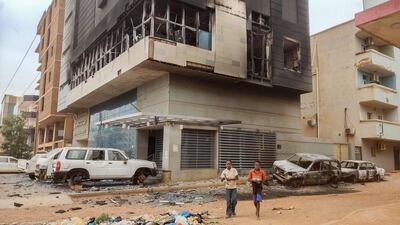Saudi Arabia and the US have welcomed a deal by the Sudanese army and paramilitary Rapid Support Forces to extend by a five days the ceasefire agreement they signed on May 20, the US Bureau of African Affairs said on Monday.
"The extension will provide time for further humanitarian assistance, restoration of essential services and discussion of a potential longer-term extension," the bureau said.
More than a million people could have fled Sudan by October to escape fighting, the UN warned on Monday as heavy clashes and explosions rocked southern Khartoum, while army jet fighters bombed paramilitary positions on a key Nile bridge north of the Sudanese capital, residents said.
At least 350,000 people have already fled the country and a million have been internally displaced.
UNHCR foresees about 800,000 Sudanese and 200,000 people of other nationalities leaving Sudan over six months, the refugee agency's head Filippo Grandi said in Cairo after a visit to the border with Sudan.
"This projection, that in the next few months, we'll reach these high figures, may even be conservative," Mr Grandi said. "At the beginning, I didn't believe it would be, but now I'm beginning to be worried."
The latest fighting came just hours before the expiry of a week-long ceasefire mediated by the US and Saudi Arabia that brought relative calm to Khartoum, where fighting between the army and the paramilitary Rapid Support Forces has continued since April 15.
Monday’s fighting in southern Khartoum was mostly in the districts of Jabrah and Azhary, according to residents.
About 12km north of Khartoum in Bahri, one of Khartoum’s two adjoining sister cities, army aircraft bombed RSF positions on Halfaya bridge.
While the week-long ceasefire brought some respite from the heavy fighting of the past six weeks, it failed to allow humanitarian relief to reach millions trapped in Khartoum, amid dwindling food supplies, power and water cuts, and the near complete absence of health care.

On Monday, two UN agencies – the World Food Programme and the Food and Agriculture Organisation – said Sudan was now among the UN's highest alert areas for food insecurity and needed “urgent” action from the international community.
The fighting in Sudan has been mainly focused in Khartoum but has also spread to the restive Darfur region in the west of the vast nation.
The RSF's forerunner, a Darfur-based militia known as Janjaweed, fought on the government’s side during the civil war that erupted there in the 2000s.
It was accused of committing widespread abuses against civilians.

In an ominous sign, the army on Friday called up reservists and able-bodied retired soldiers to join the war against the RSF.
The Defence Ministry said men who wished to defend themselves, their families and property should head to the nearest army base to get weapons.
The Governor of Darfur, Minni Minawai, who has declared his support for the army, has also called on residents to arm themselves to fend off attackers and looters.
The Sudan war has so far forced an estimated 1.4 million people to flee their homes, of whom nearly 350,000 have sought refuge in neighbouring countries.


